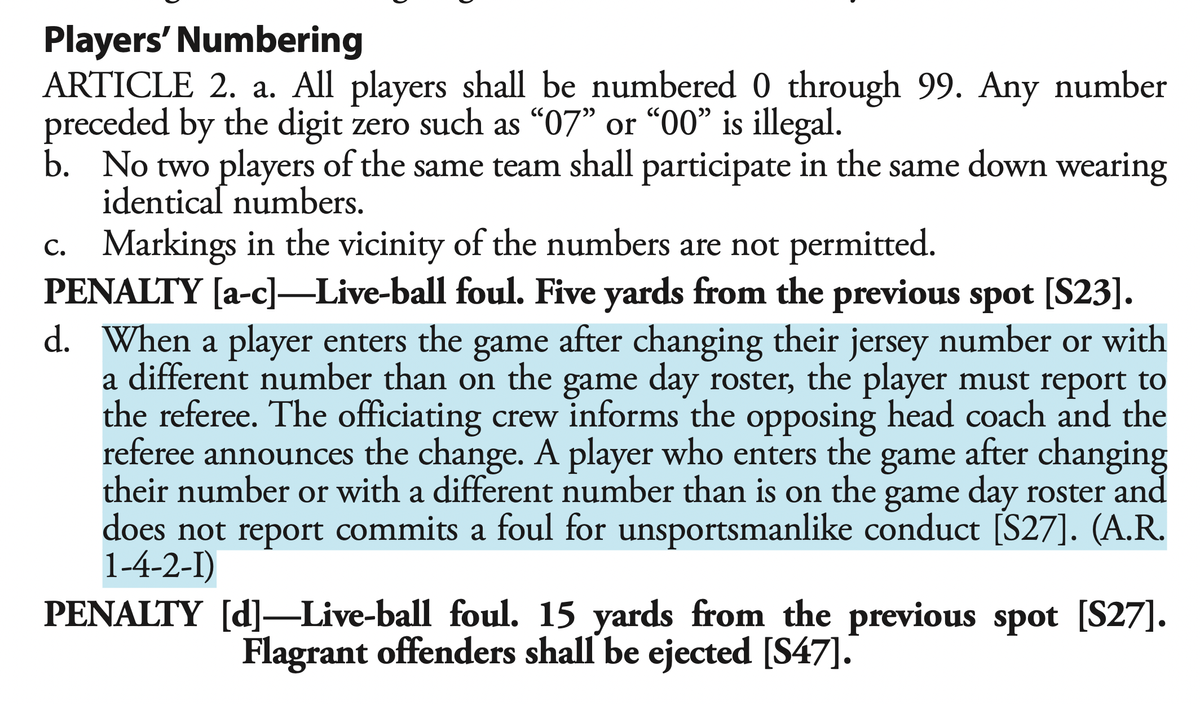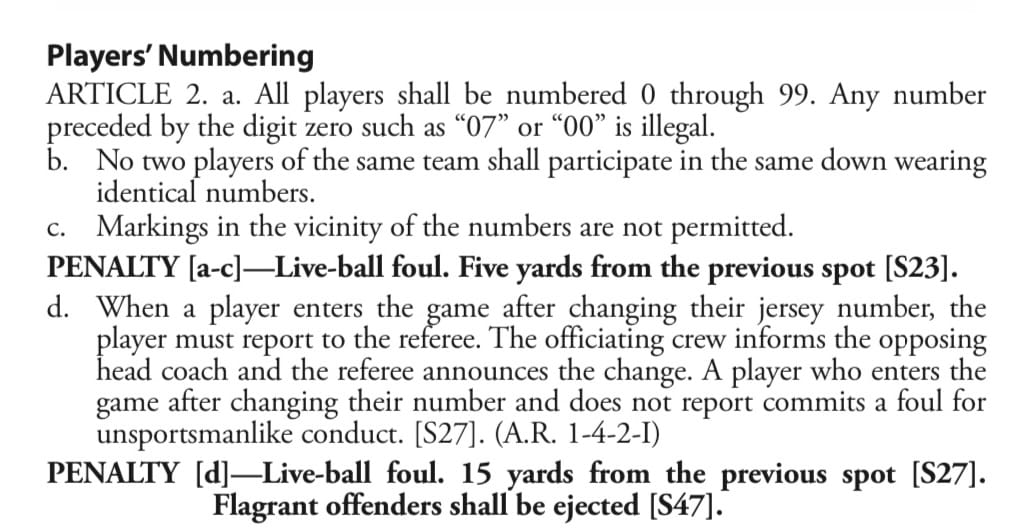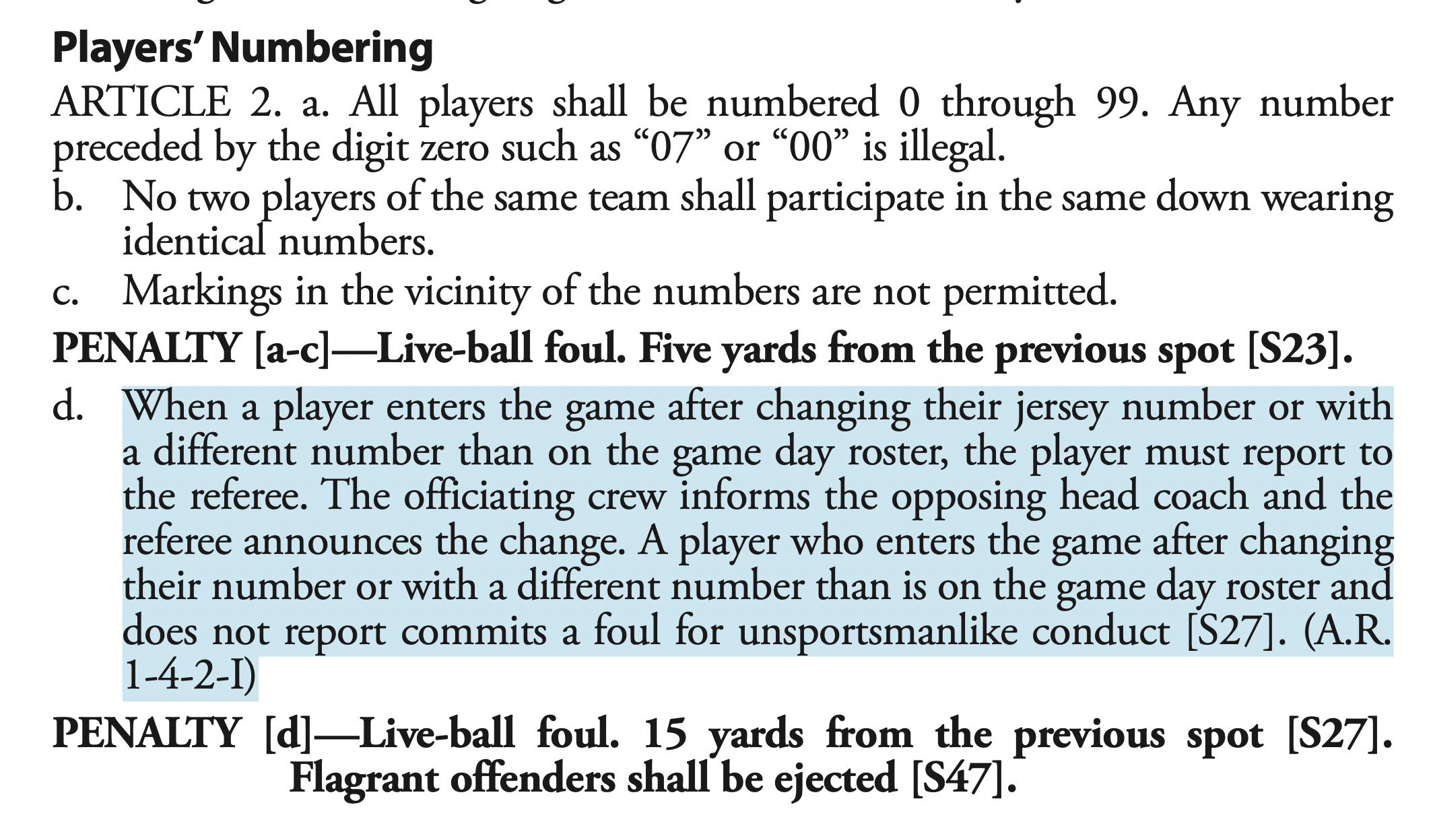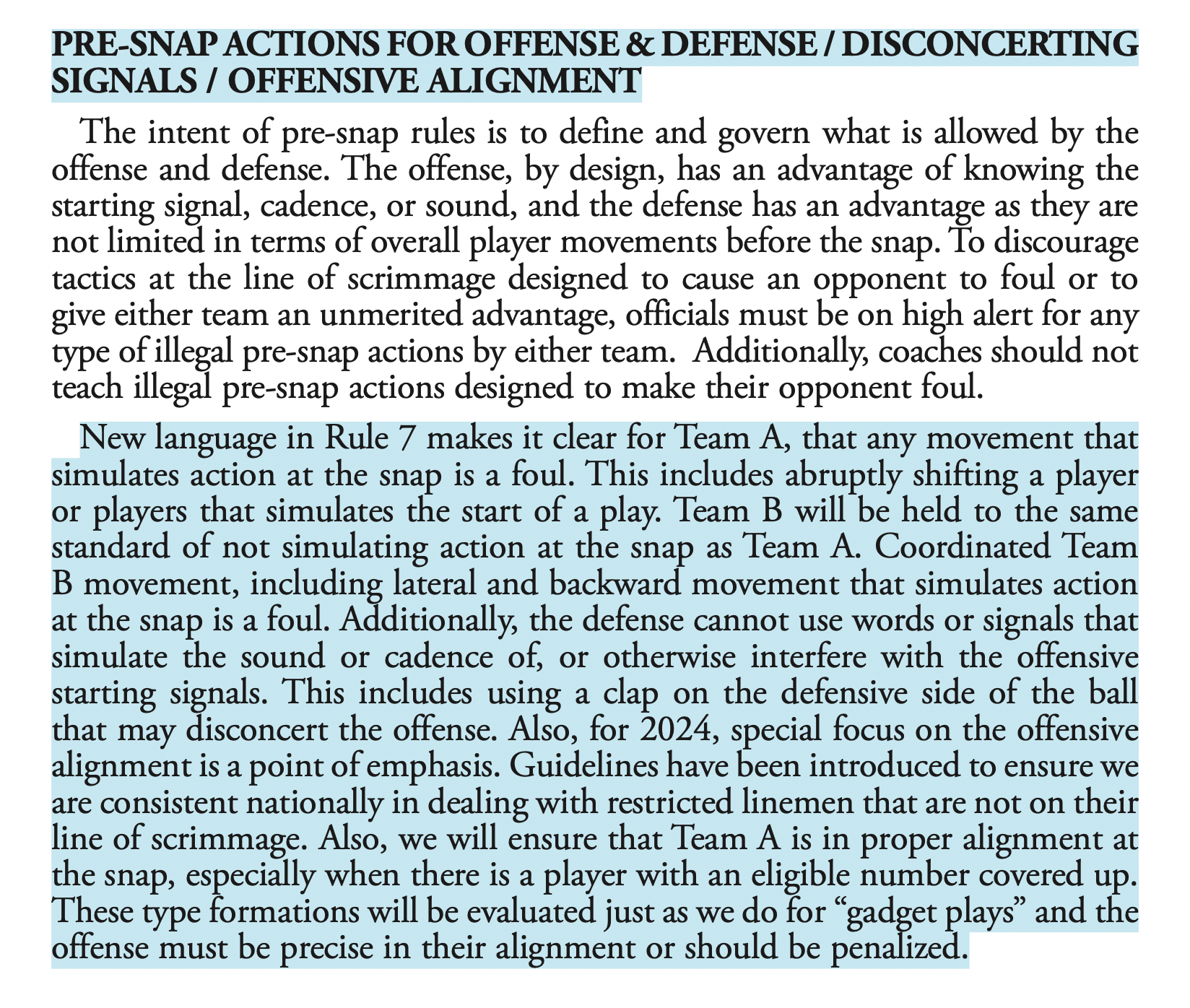Explaining The Rule Change

This is a very complicated topic. Almost every time I tweet about it, I have to spend the next hour responding with "well, not exactly - it's this." The last time I wrote about this I had to make a 25 minute video to cover the play (and the violation) from every angle. But since the new NCAA rules are out for 2024, and since they specifically changed the language of this rule to respond to what Wisconsin chose to do (or not do) against Illinois last October, I figured I'd write an explainer. Here we go.
First off, if you have 25 minutes (who doesn't have a spare 25 minutes?), the answer to every question you're going to ask in the comments is likely in this video I made last fall. I walk through the entire play and explain exactly why Wisconsin did what they did. If you've already watched the video you can skip it, but a lot of the explanation is in here:
That was early November. Now it's July and the updated rule book is out for 2024. And the NCAA reinforced the rule so that Wisconsin could not bend it. That's the most important takeaway here. Before you start thinking "was it really a broken rule or was it maybe just a technicality?", note that the NCAA specifically changed the language of the rule in response to what Wisconsin did in the Illinois game last October. If it was nothing, the NCAA would have had no need to change the language of the rule.
Here's the language change. In 2023 it said this:

And the 2024 rule book now says this:

My paraphrase of the NCAA's thought process:
"I can't believe we have to say this out loud because it seems like it was implied, but no, you cannot send a player out to warm up in one number and then change his number during the game in order to execute a trick play."
Before you get lost in language land, repeat after me three times.
"It's an honor system."
"It's an honor system."
"It's an honor system."
This is very important because it will answer all of your questions. As I said in the video above, this was the game where Johnny Newton was ejected. Had we tried to sneak Johnny Newton back in the game wearing #93 instead of #4, then obviously everyone would have noticed that this 93 kid was terrorizing the quarterback. But had we put offensive lineman Clayton Leonard in the game wearing Josh Kreutz's jersey, no one on the Wisconsin sideline nor any of the officials would have had any idea. What, are they supposed to memorize everyone's faces? They simply trust us when we say that #64 is Josh Kreutz.
It's an honor system. Numbers exist for the other team. The opponent scouts #64 and #65 and #66 and then they make decisions based on which players are in the game. The officials trust that the players are who you say they are because the players are literally wearing face masks. It's an honor system. There's firewood by the side of the road and it's up to you to put a $10 bill in the lockbox. If you just take the firewood and don't leave any money, well, you have no honor.
As I say in the video above, there was a meeting somewhere in the Wisconsin football facility the week of the game. They discussed the tackle eligible play and all of the ways that Illinois might catch on. If Rucci is all of the sudden wearing #93 while the assistants are charting the active roster during warmups, Illinois will catch on that something is coming (because he's wearing the number of an eligible receiver). If they send someone who clearly isn't an offensive lineman in to pose as the left tackle – maybe the 240 lb defensive end who does wear #93 – the skinny guy on the end of the line will tip people off to a possible trick play. With the report rule (and with teams building active rosters for their coaches during the pregame by charting every player dressed), there's just no way to run tackle eligible to Rucci without sending him out there in his real number. And then he'd be ineligible to catch a pass.
Then someone in the meeting raises their hand. "What if we have him warm up wearing #66 but then change into #93 for that play?" And someone immediately responds with "well then he'd have to report to the official." And someone else – the shadiest guy in the room with bundles of firewood in his trunk that he did not pay for – says "but what if he just... forgets to report to the official?" They all look around the room – some secretly hoping this idea gets shot down and some doing the Jack Nicholson "yesssss" nod – and Luke Fickell decides to do it.
Their logic (as I said in the video): is it REALLY changing your number if you only warmed up in that number and never participated wearing that number that day? Sure, it feels kind of shady sending him out there to warm up in a different number so that he'll get charted, but is this maybe enough to claim "sorry, didn't know he had to report if it was his first play"? Wisconsin obviously thought so.
This rule change is the NCAA saying "absolutely not." If the roster says Rucci is #66, he must participate as #66 or, if he needs to change his number for some special teams play where there might be two players wearing #66 on the field, he must report his number change to the official. We do that all the time (some second-stringer on punt coverage has the same number as the punter and an injury means he has to go in there so he changes into #37 and goes to tell the official). It's the only way the official will know that #37 is the guy who normally wears #19.
That's what is going on here. That is why I'm very curious to see if the Wisconsin media asks Luke Fickell about the NCAA rule change based on his trick play in the Illinois game (10 years ago, a beat reporter would absolutely ask it, but now?). And it brings up one final question:
What stops Wisconsin from just blowing through the stop sign and doing it again?
I don't really have a good answer for that. When you see someone stealing firewood from the roadside stand and you tell the guy "you know the county just made it specifically illegal to steal firewood and not put any money in the honesty box", he can just say "yeah, I don't care" and there's nothing you can do or say. There would need to be a cop standing right there.
So if a number change were to be noticed mid-play during a Wisconsin game in the future, then yes, there is now a mechanism for the officials to flag them for 15 yards because the number does not match the official roster and he did not report to the official. But it's not something the officials are actively monitoring during any game they officiate (again, honor system). It would require the coaching staff on the opposite sideline to notice it and convince one of the officials to flag it before the next play starts.
Which is why my takeaway in July is the same as my takeaway in late October/early November when I made that video. The main thing this tells me is that Luke Fickell has no problem, uh, "going there." Remember the clapping the Wisconsin players were doing ("disconcerting signals") earlier in that game to throw off our snap count? Oh, hey, look at that, another section of the rulebook that was amended this offseason:

"Coaches should not teach illegal pre-snap actions design to make their opponent foul." Good thing the Wisconsin coaches didn't teach that and their players just came up with it on their own out of nowhere.
Look, Wisconsin won the game with this trickery and our staff didn't notice until film review (because they believed their charting would prevent such a thing, not considering that Wisconsin might do a post warm-up jersey swap). Our defensive players could have still saved it by noticing that the left tackle was actually the sixth guy on the line (and in an eligible number) but they didn't. Wisconsin scored with 27 seconds left and won the game 25-21. They went 7-5 and we went 5-7. It was a classic Memorial Stadium Wind Game, and Wisconsin played it to perfection in the 4th quarter. Even if the play would have been flagged, Wisconsin kicks the field goal and we would have gone to overtime.
So I'm left to settle on this as my takeaway: Wisconsin is no longer "the honorable Barry L. Alvarez, presiding" Wisconsin. The program I've wanted us to become for the last 30 years (how many times have I written about that? 10?) is no longer the program I want us to become. Yes, Wisconsin fans, I'm sure you're crushed to have lost my admiration from afar.
But that's where I've landed. I'm actually happy that they're no longer on the yearly schedule because it's just not fun to watch a game where the opponent does annoying things like this. Maybe I have Fickell all wrong and I'll regret this article in a few years but... my view of Wisconsin football has significantly changed.
As has the NCAA rulebook.
